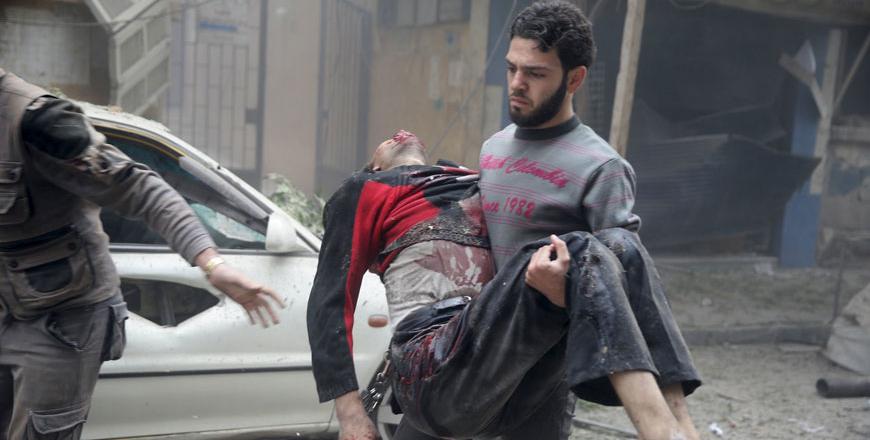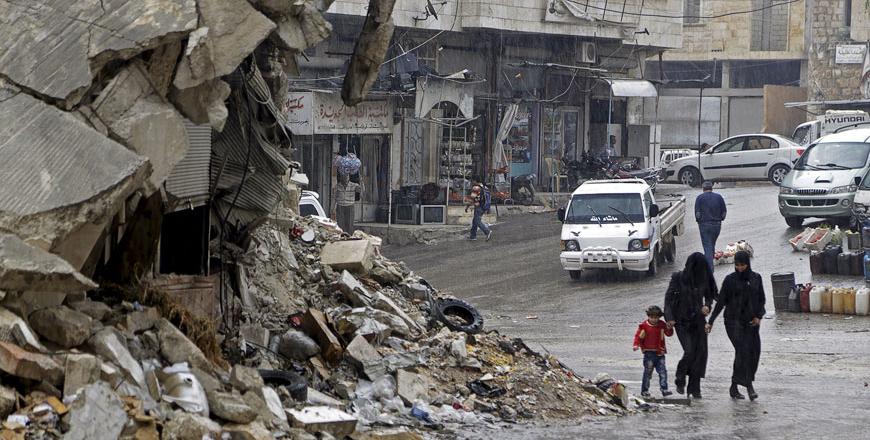You are here
US aims to see if Iran, Russia ready to dump Syria’s Assad
By Reuters - Oct 29,2015 - Last updated at Oct 29,2015

A resident carries an injured man through a site damaged from what activists said was an air strike by forces loyal to Syria’s President Bashar Assad in the town of Douma, Eastern Ghouta in Damascus, on Thursday (Reuters photo)
VIENNA — The United States said on Thursday it hoped a new round of international talks on Syria's civil war would clarify whether Tehran and Moscow could eventually accept a new leadership in Damascus, a senior US official said on Thursday.
More than a dozen powers were headed to Vienna for a fresh effort on Thursday and Friday to end Syria's four-year civil war in which the United States and its Western and Gulf allies are at odds with Russia and its regional supporters, including Iran.
The comments from State Department counselor Tom Shannon, who has been tapped to become the third-ranking US diplomat, were the most specific so far on US goals for the meetings. Hopes for success at the talks, which bring regional rivals Iran and Saudi Arabia face to face, are low, Western officials said.
US Secretary of State John Kerry was due later on Thursday to meet Iranian Foreign Minister Mohammad Javad Zarif, who is attending high-level talks on Syria for the first time, US officials said.
Zarif told reporters upon arrival in Vienna that he would only discuss the July nuclear deal with Kerry. He added that no solution to the Syria crisis was possible without Iran.
"Those who tried to resolve the Syrian crisis have come to the conclusion that without Iran being present, there is no way to reach a reasonable solution to the crisis," Zarif said.
Kerry said on Wednesday that Washington was stepping up its diplomacy to end the Syrian conflict, even as it increases support for moderate rebels fighting Daesh militants.
Speaking in Washington, Shannon said Kerry aimed to test whether Russia and Iran were willing to reverse course and push Syrian President Bashar Assad to leave power and to gauge the two countries' commitment to fighting Daesh.
Shannon told lawmakers Kerry wanted to assess "the extent to which they are prepared to work broadly with the international community to convince Mr Assad that during a political transition process he will have to go".
A senior US official in Vienna, speaking to Reuters on condition of anonymity, said: “[It is] significant that Iran is here, but until we meet and hear their views, hard to say whether we can find common ground.”
At least a quarter of a million people have been killed in the Syrian war, the United Nations says.
Low expectations
Kerry was also scheduled to meet Russian Foreign Minister Sergei Lavrov and the foreign ministers of Turkey and Saudi Arabia later on Thursday, a US official said.
Lavrov is also expected to meet with Zarif and other foreign ministers. Ministers from Jordan, Egypt, Britain, France and Germany are among those attending the talks.
The talks in Vienna will be the first time Iran and Saudi Arabia, regional arch rivals who have been deeply critical of each other’s role in the crisis, have met across the table since the conflict erupted in Syria in March 2011.
Tehran, like Moscow, is a staunch backer of Assad, whom Saudi Arabia, Turkey and their Western and Gulf allies oppose.
Iran has shown no signs it is ready to dump Assad. A senior Iranian official told Reuters there was no candidate to replace Assad and the priority was to help him defeat Daesh militants, who have seized large swathes of Syria and neighbouring Iraq.
“We have been helping Syria on this matter and will continue to do so as long as it is needed by the government,” he said.
One senior Western diplomat said just keeping the players at the conference table and avoiding a collapse of the talks would represent modest success.
“I wouldn’t expect too much,” a senior Western diplomat said. “But the Americans are putting a lot of diplomacy into this and Kerry is his usual sort of upbeat self.”
Diplomats said a possible outcome of the Vienna talks was a plan for pushing Syria negotiations forward.
Divisions between Moscow and the West over Syria have deepened since Russia began bombing opposition fighters last month.
Neither Syria’s main political opposition body, which has objected to Iran’s participation, nor representatives of the armed opposition were invited to the meeting.
Assad’s government has yet to comment on the talks.
Russia has called for elections in Syria, though Assad has said that fighting “terrorism” must take priority. Assad’s government describes all groups opposing him as terrorists.
Related Articles
VIENNA — The success or failure of the Syrian peace talks this week is tied to the fate of one man who’s not even at the table: President Ba
Iran’s foreign minister held rare private talks with his US counterpart on Sunday and said it would be a “disaster” if Tehran did not turn a provisional agreement to defuse a decade-old dispute over its nuclear programme into a permanent deal.
RIYADH/DUBAI — Saudi Arabia and Iran announced they would attend international talks in Vienna on Friday on the war in Syria, in the first m












